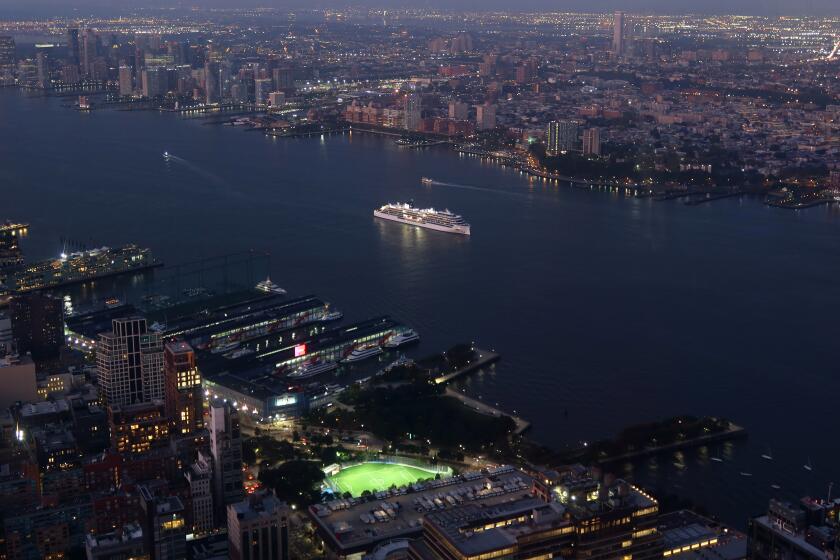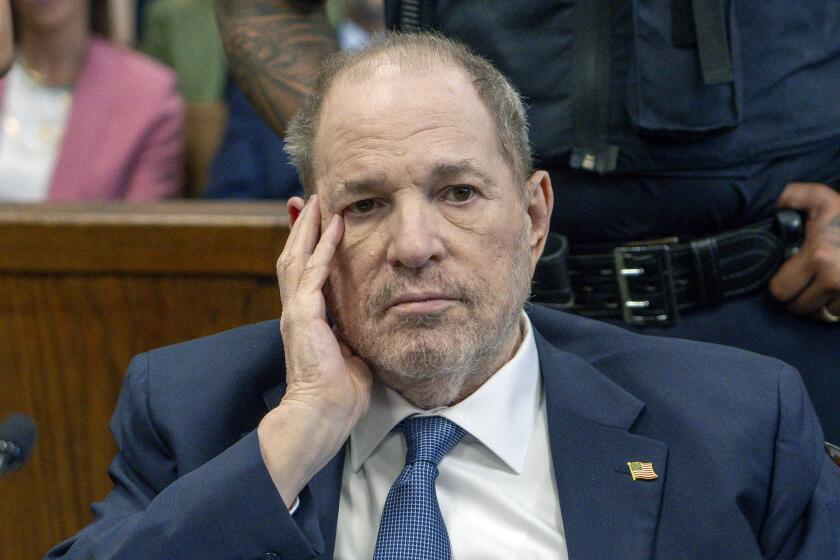U.S. Lays Plans for Interrogation, Trials
As the last Al Qaeda stronghold in Afghanistan appeared headed for collapse, the Pentagon on Tuesday began laying out its plans to handle the unprecedented task of bringing to justice hundreds of enemy fighters that U.S. forces expect to round up.
Defense Secretary Donald H. Rumsfeld said U.S. troops will route Al Qaeda and Taliban fighters through large detention centers in the South Asian nation and, after interrogation, send some to stand trial before criminal justice systems in Afghanistan, the United States or the fighters’ home countries.
But Rumsfeld made it clear that the U.S. does not intend to let even its closest allies stand in the way of the stern justice that the Bush administration believes is due any fighters who committed or abetted terrorist acts.
He said U.S. forces will try to prevent enemy leaders from falling into the hands of peacekeeping troops from allied nations that might oppose capital punishment. And he vowed that U.S. military authorities will not send non-Afghan fighters to their home countries--no matter how friendly those nations are to the United States--if it appears that their terrorist deeds would be overlooked.
“We would only send them back to a country where we felt the country had a similar attitude to ours about the undesirability of people running around and engaging in mass murder,” Rumsfeld said at a Pentagon briefing.
The plans are taking shape as coalition forces close in on the remnants of Al Qaeda’s fighting force in the Tora Bora area of eastern Afghanistan.
The disclosure of U.S. plans underscored the complexities of this unconventional war, in which the U.S. government views Taliban and Al Qaeda fighters not just as combatants who can be captured and disarmed, but as possible criminals. This is forcing U.S. officials to devise a new strategy and is raising a variety of legal issues and diplomatic challenges.
“This is all very novel,” said Ivo Daalder, a Brookings Institution scholar. “They’re in this nether world between law enforcement and military action, and they’re having to try to make it up as they go along.”
Rumsfeld said the U.S. military will first round up “very large numbers” of enemy fighters for interrogation as part of the ongoing U.S. effort to gather intelligence about Al Qaeda’s operations and methods. The interrogations would take place in Afghanistan at camps of either anti-Taliban fighters or U.S. forces.
Then the prisoners would be moved to detention areas, again controlled either by the Afghan opposition or U.S. forces. U.S. Marines have begun building such a facility at Camp Rhino, their base about 70 miles southwest of the Afghan city of Kandahar. Another such facility may be put in place at Bagram Air Base, about 20 miles north of Kabul, the Afghan capital.
Some Could Face U.S. Military Tribunals
Rumsfeld said some detainees may eventually be sent to the United States or to American ships at sea, while others may be returned to their home countries. He did not elaborate on which prisoners might go to each location.
Some prisoners could be taken before the U.S. military tribunals that President Bush authorized last month for trying accused terrorists. A large team of military lawyers is drafting plans for those proceedings, but Rumsfeld emphasized that many specifics have yet to be worked out. One key issue is which prisoners would face such tribunals and which would be turned over to authorities in other countries.
Rumsfeld declined to identify the countries to which the U.S. might agree to send foreign fighters for trial. But the issue could be a thorny one for the U.S.
Most Al Qaeda members who are not Afghan are from Pakistan, Chechnya, Saudi Arabia or Egypt. Based on their history of treating accused terrorists, the Russians, Saudis and perhaps the Egyptians would be expected to sternly handle the accused.
But assuring that justice is administered to Al Qaeda members from Pakistan could prove difficult. Even though the government of Pakistani President Gen. Pervez Musharraf has become a close ally, many in his nation are sympathetic to the Taliban and its Al Qaeda allies.
“I would think Pakistan would be a real problem,” said analyst Daalder.
Britain Debates Fate of Bin Laden
Rumsfeld said explicitly that the U.S. did not want any countries that intend to send peacekeepers to Afghanistan and that prohibit the death penalty to take custody of senior Al Qaeda or Taliban figures.
There has been a debate in Britain this week on whether Osama Bin Laden, if captured by British forces, could be turned over to the Americans, because European Union rules bar extradition of prisoners if a death penalty is the likely outcome of a conviction. Prime Minister Tony Blair’s office has insisted that British authorities would have no problem turning over any accused terrorist to the Americans if the defendants were captured on foreign, rather than British, soil.
Rumsfeld said that while it was the “privilege” of other nations to ban the death penalty, “we don’t want it to get in our way with respect to the people who fit in these senior-level categories.”
A senior U.S. defense official who spoke on condition of anonymity said Rumsfeld’s views represent “a warning shot [to other countries] that we have a vested interest in this issue.”
More to Read
Start your day right
Sign up for Essential California for news, features and recommendations from the L.A. Times and beyond in your inbox six days a week.
You may occasionally receive promotional content from the Los Angeles Times.






